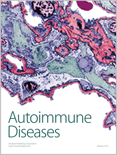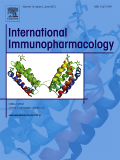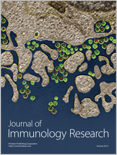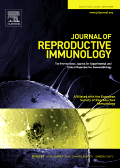
Autoimmune Diseases
Scope & Guideline
Empowering knowledge in immunology and beyond.
Introduction
Aims and Scopes
- Investigation of Autoimmune Mechanisms:
The journal focuses on the underlying mechanisms of autoimmune diseases, including molecular mimicry, immune system dysregulation, and the role of cytokines and antibodies. - Clinical Characteristics and Management:
It highlights studies that characterize various autoimmune diseases, including demographic differences, clinical presentations, and treatment outcomes, providing insights into best practices in patient care. - Impact of Infections on Autoimmunity:
A significant area of interest is the relationship between infections (e.g., COVID-19) and the exacerbation or triggering of autoimmune diseases, exploring how pathogens can influence immune responses. - Biomarkers and Diagnostic Tools:
The journal emphasizes research on potential biomarkers for diagnosing autoimmune diseases and assessing disease activity, aiming to improve diagnostic accuracy and patient monitoring. - Therapeutic Innovations and Clinical Trials:
There is a consistent focus on innovative therapies and clinical trials aimed at improving treatment outcomes for patients with autoimmune conditions.
Trending and Emerging
- Autoimmunity and Infectious Diseases:
Recent publications highlight the intersection of autoimmune diseases with infectious agents, particularly the implications of COVID-19 on autoimmune conditions, marking a significant trend in research. - Novel Biomarkers for Autoimmune Diseases:
There is an increasing focus on identifying and validating new biomarkers for diagnosis and monitoring of autoimmune diseases, such as interleukin-40 and 14-3-3η, which may enhance clinical practice. - Systematic Reviews and Meta-Analyses:
The trend towards systematic reviews and meta-analyses signifies a commitment to consolidating existing research findings, providing comprehensive insights into treatment efficacy and disease characteristics. - Personalized Medicine in Autoimmunity:
Emerging themes surrounding personalized medicine and tailored therapeutic approaches reflect a growing understanding of the heterogeneity of autoimmune diseases and the need for individualized care.
Declining or Waning
- Animal Models in Autoimmunity Research:
There is a noticeable decrease in studies utilizing animal models for understanding autoimmune pathogenesis, possibly due to a shift towards more clinically relevant human studies. - Rare Autoimmune Conditions:
Research on less common autoimmune diseases has become less frequent, with a greater emphasis on more prevalent conditions, potentially overshadowing important but niche areas. - Historical Perspectives and Reviews:
The journal has seen a reduction in articles focusing on historical reviews of autoimmune diseases, as the focus shifts towards novel research findings and contemporary clinical data. - Ethnic and Gender Disparities Research:
While still relevant, specific studies examining ethnic and gender disparities in autoimmune diseases are becoming less prevalent, possibly due to a more generalized approach in recent research.
Similar Journals

JOURNAL OF CLINICAL INVESTIGATION
Innovating healthcare solutions with groundbreaking research.JOURNAL OF CLINICAL INVESTIGATION is a premier scholarly journal published by the American Society for Clinical Investigation, dedicated to advancing the field of clinical research and medicine since its inception in 1945. With an impressive impact factor and ranked Q1 in the field of Medicine (miscellaneous), it stands out as a leading source of high-quality research, reflecting its exceptional position in Scopus ranking as #13 out of 636 in General Medicine, placing it in the 98th percentile. The journal focuses on groundbreaking studies that explore the underlying mechanisms of human disease, facilitating a deeper understanding that drives clinical practice and innovation. Although it is not an open-access journal, the insights and findings published in this esteemed journal are essential reading for researchers, healthcare professionals, and students aspiring to contribute to the dynamic landscape of clinical investigation. Published in the United States, it continues to shape the dialogue and advancement within the medical community through its rigorous peer-review process and commitment to excellence.

CRITICAL REVIEWS IN IMMUNOLOGY
Unlocking the Complexities of Immune ResponsesCRITICAL REVIEWS IN IMMUNOLOGY, published by BEGELL HOUSE INC, is an essential journal in the field of immunology that has been contributing to the scientific discourse since 1980. With its ISSN 1040-8401 and E-ISSN 2162-6472, this journal provides a platform for critical analysis and comprehensive reviews that deepen understanding of immune responses and their implications in health and disease. Although currently categorized in the Q4 quartile for Immunology and Q3 for Immunology and Allergy, the journal's quality research and scholarly contributions are crucial for advancing knowledge within its fields—encompassing various aspects of innate and adaptive immunity. Researchers and professionals in immunology will find invaluable insights, aiding them in their quest for innovation and excellence, as the journal aims to foster interdisciplinary collaboration. While it does not operate on an open-access model, CRITICAL REVIEWS IN IMMUNOLOGY remains a significant resource for those dedicated to pushing the boundaries of immunology, with annual publications expected to last well into 2024 and beyond.

International Immunopharmacology
Connecting Researchers to the Future of Immune System ScienceInternational Immunopharmacology, published by Elsevier, stands as a prominent journal within the disciplines of immunology and pharmacology. With an ISSN of 1567-5769 and an E-ISSN of 1878-1705, this esteemed journal is based in the Netherlands and features a robust commitment to disseminating high-quality research from its inception in 2001 through 2024. The journal has achieved impressive rankings, securing a Q1 category in Pharmacology and Q2 in both Immunology and Immunology and Allergy as of 2023. With its strategic focus on bridging the gap between immunology and pharmacological applications, International Immunopharmacology attracts a diverse readership, including researchers, healthcare professionals, and students interested in the latest advancements in therapeutic agents and immune system modulation. Furthermore, it offers an open access option, enhancing the accessibility and reach of its invaluable content. As a pivotal resource in the field, this journal not only facilitates the exchange of innovative ideas but also fosters a deeper understanding of the complexities of immunopharmacology in today’s research landscape.

AIMS Allergy and Immunology
Unveiling Innovations in Allergy and ImmunologyAIMS Allergy and Immunology is a prestigious open access journal dedicated to advancing knowledge in the fields of allergy and immunology. Published by the American Institute of Mathematical Sciences (AIMS), this journal provides a vibrant platform for researchers, practitioners, and scholars to share groundbreaking findings and insights. Recognized for its commitment to disseminating high-quality research since its inception in 2017, AIMS Allergy and Immunology contributes significantly to the understanding of complex immunological mechanisms and allergic responses, thus playing a pivotal role in enhancing clinical practices and therapeutic strategies. With its ISSN 2575-615X, the journal aims to facilitate a robust exchange of ideas and promote collaboration within the scientific community. Researchers and practitioners are encouraged to access the latest studies and reviews, which are all freely available online, ensuring that vital information reaches a global audience without barriers. Together, we can tackle the challenges posed by allergies and immune disorders through rigorous scientific inquiry and innovation.

Journal of Immunology Research
Connecting Researchers: Elevating the Study of Immunology WorldwideJournal of Immunology Research, published by HINDAWI LTD, stands as a pivotal open-access journal in the realm of immunology, with a particular emphasis on advancing knowledge in both fundamental and applied aspects of the field. Since its inception in 1990, the journal has committed to the dissemination of high-quality research, earning a respectable impact factor that reflects its significance. Based in Egypt, it provides a platform for researchers from around the world, showcasing innovative studies and reviews that contribute to the understanding of immune system mechanisms. Its 2023 rankings place it in the Q2 category for Immunology and Allergy, and Q1 in the broader category of Medicine (miscellaneous), indicating a strong reputation among its peers. Through its open-access model, the journal promotes wide accessibility of cutting-edge research, catering to researchers, professionals, and students alike. With ambitions that converge through 2024, the Journal of Immunology Research continues to be an essential resource for those seeking to explore the forefront of immunological science.

INTERNATIONAL JOURNAL OF IMMUNOPATHOLOGY AND PHARMACOLOGY
Fostering Collaboration in the Realm of Immune Research.Welcome to the International Journal of Immunopathology and Pharmacology, a premier publication dedicated to advancing the fields of immunology and pharmacology. Published by SAGE Publications Inc., this Open Access journal has been a vital resource since its inception in 1989, providing an expansive platform for innovative research and comprehensive reviews until 2024. With a strong focus on the mechanisms of immune responses and therapeutic developments, our journal stands out with a 2023 impact factor reflected in its Q3 ranking in Immunology and Allergy, and a Q2 ranking in Pharmacology. The journal's Scopus rankings highlight its significance, ranking #174 in Pharmacology, #141 in Medicine, and #156 in Immunology, all affirming its role in contributing to the broader scientific community. Through rigorous peer review and a commitment to high-quality research, the International Journal of Immunopathology and Pharmacology continues to be an essential resource for scientists, healthcare professionals, and students striving to enhance their knowledge and understanding in these critical fields.

JOURNAL OF REPRODUCTIVE IMMUNOLOGY
Unveiling the complexities of reproductive immunology.The JOURNAL OF REPRODUCTIVE IMMUNOLOGY, published by Elsevier Ireland Ltd, stands as a pivotal platform for exploring the intricate interactions between reproductive health and the immune system. With an ISSN of 0165-0378 and an E-ISSN of 1872-7603, this esteemed journal spans over four decades, from 1979 to 2024, contributing significantly to the fields of Immunology, Reproductive Medicine, and Obstetrics and Gynecology. Currently ranked in Q2 for Immunology and Allergy and Q1 for both Obstetrics and Gynecology and Reproductive Medicine, it serves as an invaluable resource for researchers, professionals, and students dedicated to advancing knowledge in reproductive health. The journal’s notable impact factor and rigorous peer-review process underscore its commitment to high-quality research, making it an essential reference point for ongoing studies in this ever-evolving discipline. By promoting interdisciplinary discussions and pioneering research findings, the JOURNAL OF REPRODUCTIVE IMMUNOLOGY fosters a deeper understanding of the immune mechanisms that influence reproductive outcomes.

JOURNAL OF CLINICAL IMMUNOLOGY
Connecting Researchers to the Heart of ImmunologyJOURNAL OF CLINICAL IMMUNOLOGY, published by SPRINGER/PLENUM PUBLISHERS, is a leading journal in the field of immunology, with an impressive standing as reflected in its Q1 ranking in both Immunology and Immunology and Allergy for 2023. With a history of publication dating back to 1981 and an E-ISSN of 1573-2592, this journal aims to disseminate cutting-edge research on diagnostic methods, therapeutic strategies, and understanding the mechanisms underlying immune responses. Its significant impact is underscored by its Scopus rankings, where it is placed in the top 15% of journals covering immunology and microbiology. The journal does not currently operate under an Open Access model, yet offers a robust platform for sharing essential findings that contribute to advancements in clinical immunology. As a resource for researchers, professionals, and students, the JOURNAL OF CLINICAL IMMUNOLOGY is pivotal in fostering dialogue and disseminating knowledge that enhances our understanding of immune-related diseases.

HUMAN IMMUNOLOGY
Fostering Knowledge in Immune Health and DiseaseHUMAN IMMUNOLOGY, published by Elsevier Science Inc, serves as a critical platform for disseminating research in the fields of immunology and allergy, as well as various aspects of miscellaneous medicine since its inception in 1980. With an ISSN of 0198-8859 and E-ISSN 1879-1166, this journal is pivotal for researchers and practitioners looking to advance their understanding of human immune responses and related conditions. The journal currently holds a respectable position within its field, as highlighted by its 2023 Scopus ranks—#114/233 in Immunology and Allergy and #132/236 in Immunology and Microbiology. Moreover, it maintains a Q2 quartile ranking in both Immunology and Allergy and miscellaneous Medicine, underscoring its influence and reach within the scientific community. Although it does not currently offer Open Access options, HUMAN IMMUNOLOGY remains dedicated to providing valuable insights and fostering academic discourse within its discipline, characterized by a rigorous peer-review process and a focus on innovative research trajectories.

European Journal of Inflammation
Exploring groundbreaking research in immunological health.The European Journal of Inflammation, published by SAGE Publications Inc, is a dedicated platform for the dissemination of innovative research in the field of immunology and inflammation, with a strong commitment to advancing scientific knowledge in allergy and related disciplines. Established in 2004, this open access journal has been providing a crucial avenue for researchers, practitioners, and students to share findings and insights in an increasingly important area of health science, especially since transitioning to open access in 2017. With an ISSN of 1721-727X and an E-ISSN of 2058-7392, the journal has made significant strides, though currently holds a Q4 category ranking in the realms of Immunology and Allergy according to 2023 quartiles. The journal's visibility is further reflected in its Scopus ranks, positioned at #190 in Medicine (Immunology and Allergy) and #206 in Immunology and Microbiology (Immunology). Its scope encompasses a wide range of topics related to inflammation, making it a valuable resource for those engaged in cutting-edge research. With a rapidly evolving landscape in immunological research, the European Journal of Inflammation stands as an essential resource for anyone looking to stay informed and contribute to this vital area of medicine.